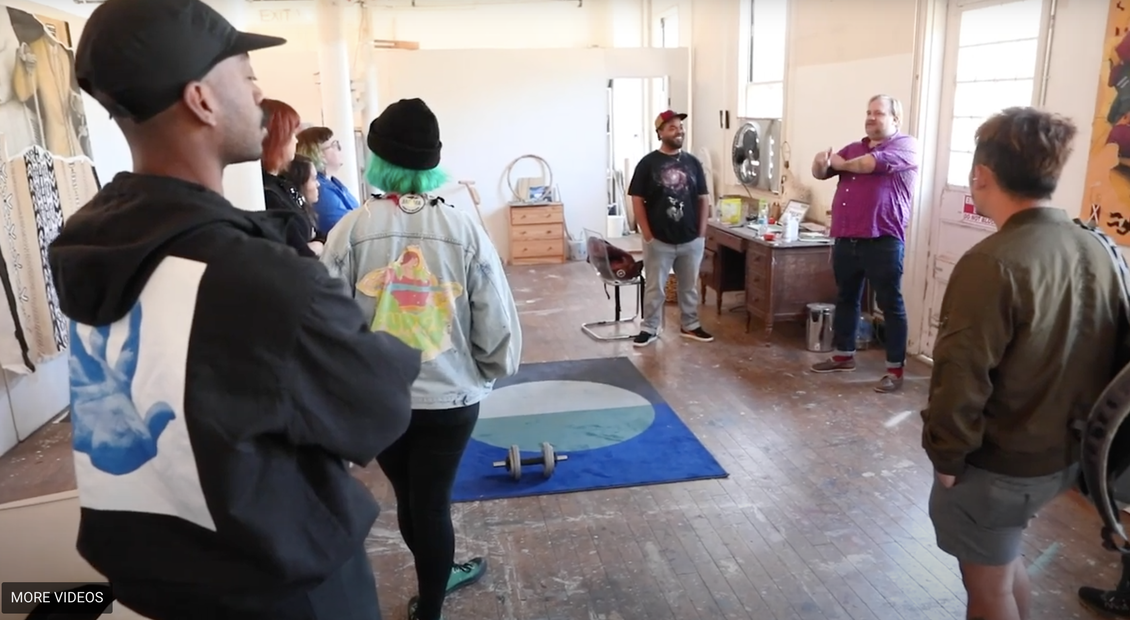Review Process

Graduate Fine Arts students are required to undergo two formal committee reviews: an Advancement Review at the end of their first year, and a Final Review during their final semester.
Reviews are scheduled to last approximately one hour. The review takes place in the student's studio or another predetermined space on campus.
The review schedule will be shared by email from the Graduate Fine Arts Office at least one week prior to the reviews.
Advancement Review
Advancement Reviews are required of first year Graduate Students who are enrolled in Dialogues and Practices 2 (DP2). Advancement Reviews are scheduled for late March/early April in the first year of study.
The review committee has three members: Main Advisor, the DP2 Instructor, and a Graduate Office Representative. The Student is to present a selection of their work, accompanied by a written statement (guided in their DP2 section).
The Advancement Review is 50 minutes, and will be structured as such:
- 35 minutes for the review, including time for student Q&A.
- 10 minutes for committee discussion without the student.
- 5 minutes for wrap up with the committee and the student.
The DP2 Faculty member is the official recorder and note-taker for the Advancement Review, ensuring that the review form is filled out in its entirety. Notes do not need to be a record of the entire conversation, but rather review highlights, suggested readings, artists to look up, and review committee reflections.
Review Objectives
Studio Practice Objectives:
Advancement Reviews examine the progress made by the student during the first year. This Review evaluates a candidate’s capacity for experimentation in their practice, as well as ability to frame basic arguments around work and identify the issues being addressed. How does this work incorporate experimentation? Has the student shown a willingness to take risks, try new approaches or methodologies?
To what degree does the work succeed formally? Is the candidate’s understanding of presentation beginning to develop?
Theoretical Practice Review Objectives:
Discuss the clarity of the student’s statement and ideas in relationship to the practice, as demonstrated in the work. Is it coherent, relevant? What does it mean to be making work like this at this time? Does it address history, theory, craft, and/or formal issues? Has the student begun to identify the questions that are being asked, and to figure out how to answer them? Are questions being asked that expand the work, as existing and as proposed?
Advancement Review Results
The following are the three possible review results:
- Pass
- Re-Review
- Leave of absence
The Review form and results will be submitted by the Graduate Fine Arts Office to the student in written narrative form within a week of the review. The student’s main advisor will communicate the committee’s decision to the student immediately following the review.
The Advancement/Final Review will result in either a Pass or a Re-Review. Re-reviews will take place during the first two weeks (the Add/Drop period) of the following fall semester. The Re-review will result in either a Pass or Non-Pass. If it is the latter, the student will be asked to take a Leave of Absence from the program for one year, at the end of which a Re-entry Review will be conducted.
A student who fails the reentry review is asked to leave the program immediately. If the student later wishes to re-enroll in the program, the student must go through the regular admissions process via the Enrollment Services Office.
Final Review
Final Reviews are required of final year Graduate Students who are enrolled in Exhibitions. The review committee has three members: Main Advisor, the Exhibitions Instructor, and a Graduate Office Representative. The Student is to present a selection of their work, accompanied by a written statement, and a Thesis excerpt.
Reviews are 50 minutes, and will be structured as such:
- 35 minutes for the review, including time for student Q&A.
- 10 minutes for committee discussion without the student.
- 5 minutes for wrap up with the committee and the student.
The Exhibition Faculty member is the official recorder and note-taker for the Final Review, ensuring that the review form is filled out in its entirety. Notes do not need to be a record of the entire conversation, but rather review highlights and review committee reactions.
Review Objectives
Studio Practice Objectives:
Final Reviews examine the progress made by the student across their two year in the Graduate Fine Arts Program atCCA. This Review evaluates a candidate’s capacity for experimentation in their practice, as well as ability to frame advanced arguments around work and identify the issues being addressed in preparation for graduation. How does this work incorporate experimentation? Has the student shown a willingness to take risks, try new approaches or methodologies? To what degree does the work succeed formally? Is the candidate’s understanding of presentation developed and successful?
Theoretical Practice Review Objectives:
Discuss the completed thesis/argument of the work, determining its coherence, originality, relevance (what does it mean to be making work like this at this time?), and relationship to candidate’s studio practice. Does it address history, theory, craft, formal issues? Can the student articulate the relationship between the formal and theoretical elements of their work?
Final Review Results
The Final Review assessment will result in Exceptional, Satisfactory, or Unsatisfactory rating.
The Review form and results will be submitted by the Graduate Fine Arts Office to the student in written narrative form within a week of the review. The student’s main advisor will communicate the committee’s decision to the student immediately following the review.